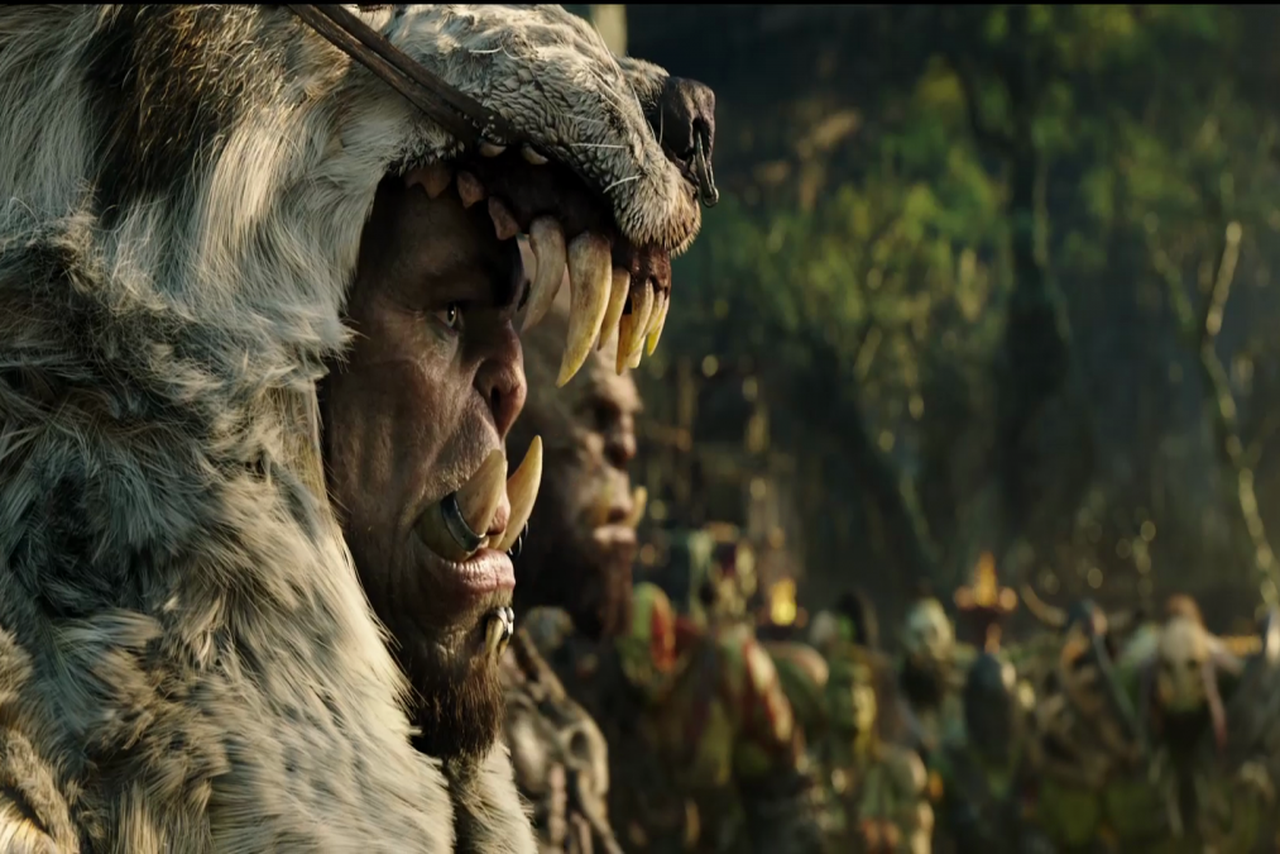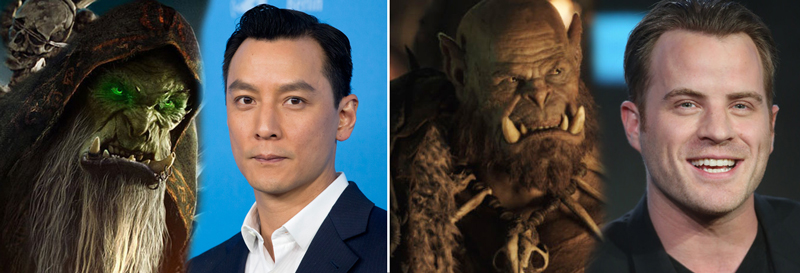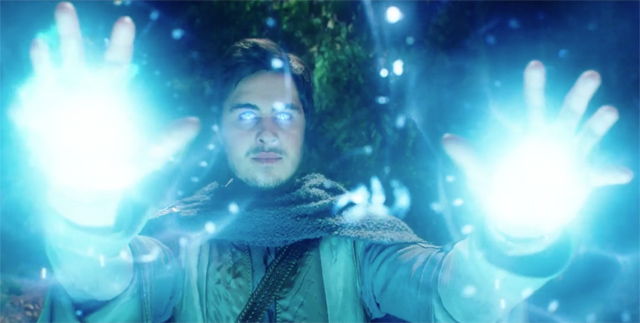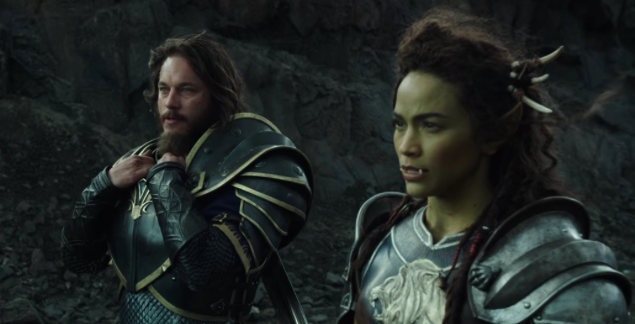Six questions that trouble me still from the Warcraft screening last week...
What on earth does Glenn Close need the money for?"
 For some reason they only hired sexy men to play these monsters
For some reason they only hired sexy men to play these monsters
That's just one of many questions I screamed into the abyss whilst watching this expensive, silly, over-stuffed but under-nourished video game adaptation. What's more this was only one of about 7 questions I screamed to which no answers came in a single scene of the movie. I couldn't even begin to tell you what was going on other than it was important enough to precede the climax of the movie. But I'll try. A young sorcerer (Ben Schnetzer) enters some sort of black gooey CGI cube and meets some sort of anthropomorphized supernatural force with sounds just like Glenn Close and finally looks just like Glenn Close as it solidifies and turns to camera upon which she/it/they bestow(s) on the young sorcerer some sort of magic that they've been withholding from some sort of bureaucrat mystics association so that he can return to battle another sorcerer to become "The Guardian" of the world of Azeroth where this all takes place...and that's not even the A plot!
The A plot is slightly less confusing...
(it's basically orcs invading a new world filled with mostly humans) but with a dozen more characters and at least three male actors (Daniel Wu of Into the Badlands, Robert Kazinsky of True Blood, and Toby Kebbel of many things) whose utter gorgeousness is wasted on audiences because they're trapped in the offscreen motion capture graveyard playing these giant ugly orcs.
 Good genetics don't always pay off onscreen
Good genetics don't always pay off onscreen
Why why whyyyy?
Actually I can answer that question. It only proves once again that most people involved in filmmaking are straight men and don't think it's an issue to keep wasting male beauty (see also: Idris Elba's 2016 in which he's played numerous animals and one alien but never a sexy human man which he, in fact, is). Gorgeous Paula Patton, the only orc that looks like a human (half-breed you see) gets to go without CGI because they know not to waste female beauty.
Who is narrating?
Generally speaking it's a good idea to make sure your audience knows who is narrating, whether you want to surprise them (I've been dead all along!) or let them get inside a particular character's head. I thought I knew who was narrating but that character dies with a good chunk of the movie still left to go so how could they have narrated it in retrospect without some kind of acknowledgement that they had, in point of fact, died?

Why are some actors so atrocious at the stylized acting that genre films require?
Though actors clearly do not respect the acting demands of the fantasy and sci-fi and horror genres (given the lack of awards that follow such work) all you have to do is watch a couple handfuls of genre films to know that it's not easy to do well. It's easy to survive such pictures, sure, since they are rarely "actor's films" but it's extremely difficult to ace them. Actors have to pitch their voice and their body and their emotional registers into a kind of just-this-side-of-real zone in order to capture whatever heightened alternate reality they're supposed to be inhabiting and sometimes it's a completely alien one. Once the actor has done this they still have to believably convey traditionally relatable emotions (often with nothing to act with given that the scene partners are often computer generated).
Like many a genre picture there's a wide range of success rates, acting-wise in Warcraft. Ruth Negga and Travis Fimmel (both no strangers to genre fare) are quite successful and feel like they exist within this particular imagined world. Paula Patton and Dominic Cooper slightly less so but they mostly get by. But it's with the sorcerers -- who actually have the showiest roles and thus the most potential for popcorn pleasure -- that we run into trouble. Ben Foster understands stylization but either he's taking this too seriously or he's not taking it seriously at all because he's a mess as the land's supreme sorcerer "The Guardian" who may or may not be looney tunes after all his time in his private mountain palace. Ben Schnetzer (who showed so much promise as the aggressively political ringleader in Pride) is even worse. He never once feels like anything other than an green actor who stumbled onto a fantasy set after a round of CW pilot auditions. He's not part of any reality presented, not "magical," and always hopelessly 2016.

How is sex going to work between these two?
Travis Fimmel is the rogue widower hero (such a trope!) of this particular franchise and, though they meet in battle, he clearly has bedroom eyes for Paula Patton's half-orc fierceness. She warns the human men who capture her that they'd they'd never survive sex with her (she'd crush their bones -- euphemism not intended -- and she implies this is an orc situation and not just that she's a soldier). So Fimmel might die if they hook up but also she has tusks coming out of her mouth so '69 is also out.
Why does Hollywood think its okay for first films to end on a cliffhanger?
Warcraft has the cockiness / stupidity to end on a cliffhanger rather than providing a full story as if it already deserves our dollars in 2018 and 2020 and so on. Note to franchise-happy Hollywood: You do actually have to earn franchise status with the proven popularity of a first movie in a potential series. Remember how The Golden Compass ended on a cliffhanger and audiences didn't like it enough and that cliffhanger was never resolved. Since Warcraft began as a video game, rather than a book series with a very specific plot, there is literally no excuse to make-up a cliffhanger when you're shaping the story other than to be an asshole who has placed future profits ahead of audience pleasure. Future profits are tough to come by if you don't pleasure the audience in the first place.